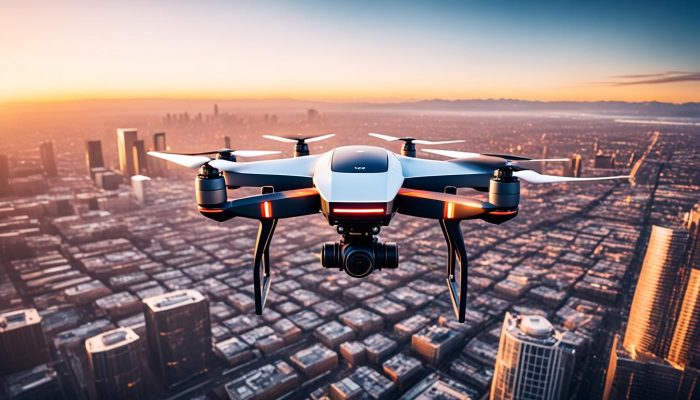Blockchain technology is changing the way we handle transactions and manage data. It uses a decentralized ledger to make sure everything is clear and safe. This helps solve big problems in digital interactions.
It’s great at keeping data safe from hackers and unauthorized changes. This isn’t just for money matters; it’s also used in things like tracking goods, keeping health records, and even in voting. Blockchain is opening up new doors for the future.
Key Takeaways
- Blockchain ensures secure transactions and data integrity.
- The technology provides a decentralized approach to data management.
- Transparency in blockchain enhances trust among users.
- It is applicable in various sectors, including finance and supply chain.
- Blockchain technology is resistant to tampering and unauthorized access.
- Its innovative applications promote efficiency and security.
Introduction to Blockchain Technology
Blockchain technology is changing the game in many areas. It’s a secure way to keep and share data, changing how we do transactions and check them. At its heart is a decentralized network, key to its success.
What is Blockchain Technology?
Blockchain is all about keeping info safe and sound. It uses blocks to store transactions, linking them together in a chain. This way, everyone can see the same data, building trust and security, especially in things like cryptocurrencies.
Key Characteristics of Blockchain
Blockchain has some key features:
- Decentralization: It doesn’t depend on one person to manage data. Everyone in the network checks transactions, making sure everything is open and fair.
- Immutability: Once info is on a blockchain, it can’t be changed or erased. This means all transactions are permanent.
- Transparency: Everyone can see all transactions, which builds trust and accountability in the network.
Blockchain Technology Uses in Secure Transactions
Blockchain technology is a top-notch way to keep transactions safe. Every time a transaction happens, it goes through a strict check. This makes sure only correct and approved data is saved. It builds a safe space for people doing financial stuff, especially with secure cryptocurrency transactions.
How Blockchain Ensures Transaction Security
Blockchain’s core strength is its special design. Each transaction gets added to a block, which links to other blocks, making a chain. This chain can’t be changed once a transaction is in it. Plus, blockchain is spread out, so no one person controls the data, making it even safer.
The Role of Cryptography in Blockchain
Cryptography is key to keeping blockchain safe. It uses special codes to hide data, so only the right people can see it. This keeps fraud and cyber threats low. Things like cryptographic hash functions and digital signatures let users make safe transactions, building trust in secure cryptocurrency deals.
Blockchain Technology Uses in Data Management
Blockchain technology is changing how we manage data. It uses a decentralized approach to make data handling more secure and efficient. This technology is a big step forward in data management.
Decentralized Nature of Blockchain
Blockchain is known for being decentralized. It doesn’t rely on one server like old systems do. Instead, it spreads data across many nodes. This makes it less likely to lose data and protects against cyber threats.
Blockchain also builds trust by having strong security layers. This makes data management more reliable.
Advantages of Using Blockchain for Data Storage
Using blockchain for storing data has many benefits. These include:
- Enhanced Security: It uses cryptography to keep data safe from unauthorized access.
- Transparency: All transactions are recorded, making it easier to track and hold people accountable.
- Efficiency: Smart contracts automate processes, cutting down on middlemen and speeding up work.
- Traceability: It lets you track changes in data, ensuring it’s correct and has a clear history.
Case Studies of Successful Data Management Solutions
Many industries have seen the success of blockchain in managing data. For instance, IBM has used blockchain for supply chain management. This lets them track products and transactions in real-time.
In healthcare, blockchain keeps patient records safe and private. It also makes sharing data between authorized groups easy. These examples show how blockchain can greatly improve data management in real life.
Additional Blockchain Technology Uses
Blockchain technology is changing the game in many areas, not just in cryptocurrency. It’s being used for smart contracts, improving supply chain management, and making voting systems better. These uses show how reliable and versatile it is.
Smart Contracts in Automating Agreements
Smart contracts are a big deal for automating deals. They are self-running contracts with rules written in code. This means deals can happen without a middleman.
This cuts down on mistakes and makes things faster. Companies use them for all sorts of things, like buying real estate or handling insurance claims. It makes everything clear and efficient.
Blockchain Applications in Supply Chain Management
Blockchain is making supply chains better by making it easier to track products. Companies can see where goods come from and where they go. This helps fight fraud and makes sure products are real.
It also builds trust between manufacturers, retailers, and buyers. Everyone can check the quality of products, making the market more honest.
Transforming Voting Systems with Blockchain
Blockchain is changing how we vote by making things more transparent. It keeps votes safe and makes sure each one counts. With secure identities, voting becomes more trustworthy.
Future Applications of Blockchain Technology
Blockchain technology is set to go beyond its early days with cryptocurrencies. New innovations are changing how we manage digital assets. This shift opens up exciting chances for different industries, making things more secure and efficient.
Digital Asset Management Innovations
New tech in managing digital assets is a big step for blockchain. Now, things like real estate or artwork can be turned into digital tokens. This makes buying and selling easier and safer. Real estate, art markets, and sports memorabilia are just a few areas set to gain from this.
Potential Beyond Cryptocurrency Transactions
Blockchain is useful for more than just digital money. It can help with identity checks, making sure people are who they say they are. It can also change how we handle digital rights, letting creators keep control over their work. Schools are looking into blockchain for sharing knowledge and checking credentials.
These examples show how blockchain can change many areas, making a big impact on the future.
Conclusion
Blockchain technology is a key driver of innovation across many sectors. It makes transactions secure and data management efficient. This technology is crucial for modern digital systems.
It brings transparency and security, which are vital for trust in various applications. As we look ahead, blockchain will keep shaping different industries.
The future holds potential for big changes in areas like contract automation and supply chain logistics. This shows the wide impact of blockchain technology.
By focusing on improving blockchain, it will change how we do business, communicate, and keep our data safe. This summary highlights blockchain’s role in making our future more efficient and transparent.
FAQ
What are the main uses of blockchain technology?
Blockchain technology is used for secure transactions, managing data, and tracking supply chains. It also helps with digital asset management, smart contracts, and voting systems. This shows its wide range of uses in different areas.
How does blockchain ensure security in transactions?
Blockchain keeps transactions safe with cryptographic methods. These encrypt data and check transactions. Only after they’re approved by the network can they be added to the blockchain.
What key characteristics define blockchain technology?
Blockchain is known for being decentralized, immutable, and transparent. This means everyone can see the same info. And once data is on the blockchain, it can’t be changed.
How does blockchain support data management?
Blockchain makes data storage safer by spreading it across many nodes. This makes it hard for hackers to attack. It also makes data more transparent and traceable.
What are smart contracts, and how do they work?
Smart contracts are digital agreements that run by themselves. They have rules written in code. When certain conditions are met, they automatically do something, like send money.
In what ways can blockchain transform voting systems?
Blockchain can change voting by keeping vote records safe and unchangeable. It makes sure voters are who they say they are. This reduces fraud and makes voting more open.
What is digital asset management in the context of blockchain?
Digital asset management with blockchain means turning real things like property or art into digital tokens. This makes buying, selling, and trading these items secure and easy.
What potential applications does blockchain have beyond cryptocurrency?
Blockchain can be used for checking identities, managing digital rights, tracking supply chains, and sharing knowledge in schools. It has many uses beyond just digital money.



